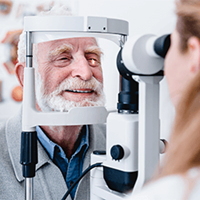What Is Macular Degeneration?
Macular degeneration is a common eye condition, particularly affecting older adults, that leads to the deterioration of the central portion of the retina known as the macula. This part of the eye is crucial for sharp, central vision, which is needed for activities like reading, driving, and recognizing faces. There are two primary types of macular degeneration: dry and wet. Dry macular degeneration is more common and progresses slowly, while wet macular degeneration is less common but can lead to rapid vision loss due to abnormal blood vessel growth under the retina. Early detection and treatment are essential to manage the progression of the disease and preserve vision. At Retina Associates of St. Louis, we offer treatment for macular degeneration to help patients maintain their quality of life. If you're in St. Louis, MO and experiencing vision changes, contact our office today to request a comprehensive eye examination.
Macular Degeneration Reviews
How Is Macular Degeneration Treated?
Macular degeneration is treated through a variety of methods depending on its type and severity. For dry macular degeneration, the focus is often on lifestyle changes such as a healthy diet rich in leafy greens and fish, taking specific vitamin and mineral supplements, and protecting the eyes from ultraviolet light. Wet macular degeneration requires more aggressive treatment, including anti-VEGF (vascular endothelial growth factor) injections to reduce abnormal blood vessel growth and leakage. We will tailor treatment plans to each patient's specific needs, utilizing the latest advancements in eye care to slow the progression of the disease and help preserve vision.
Macular Degeneration FAQ
How does macular degeneration impact vision over time?
Macular degeneration affects the central vision, which is crucial for tasks such as reading, driving, and recognizing faces. In the early stages, patients may notice blurred or distorted vision in the center of their visual field. As the condition progresses, it can create a central blind spot, making it challenging to see fine details. Dry macular degeneration often progresses slowly, while the wet form can lead to rapid vision changes.
Are there any early warning signs of macular degeneration?
Yes, there are several early warning signs that may indicate the onset of macular degeneration. These can include blurred or distorted vision, difficulty recognizing faces, and trouble adjusting to low-light environments. If you notice any of these changes, it's important to schedule an eye exam as early detection can help in managing the progression of the condition.
How often should someone with macular degeneration have eye exams?
For individuals diagnosed with macular degeneration, regular eye exams are critical to monitoring the condition's progression. It is generally recommended to have a comprehensive eye examination at least once a year, though more frequent visits may be necessary depending on the severity of the condition. These check-ups allow eye care professionals to adjust treatment plans as needed and detect any changes in vision early.
Take Action Against Macular Degeneration
If you are experiencing symptoms of macular degeneration, such as blurred vision or difficulty seeing in low light, it's essential to seek professional care immediately. At Retina Associates of St. Louis, our experienced team offers advanced treatments to manage and slow the progression of this condition. Serving the St. Louis, MO area, we are dedicated to helping you maintain your vision and quality of life. Contact us to schedule a comprehensive eye examination and explore your treatment options.





